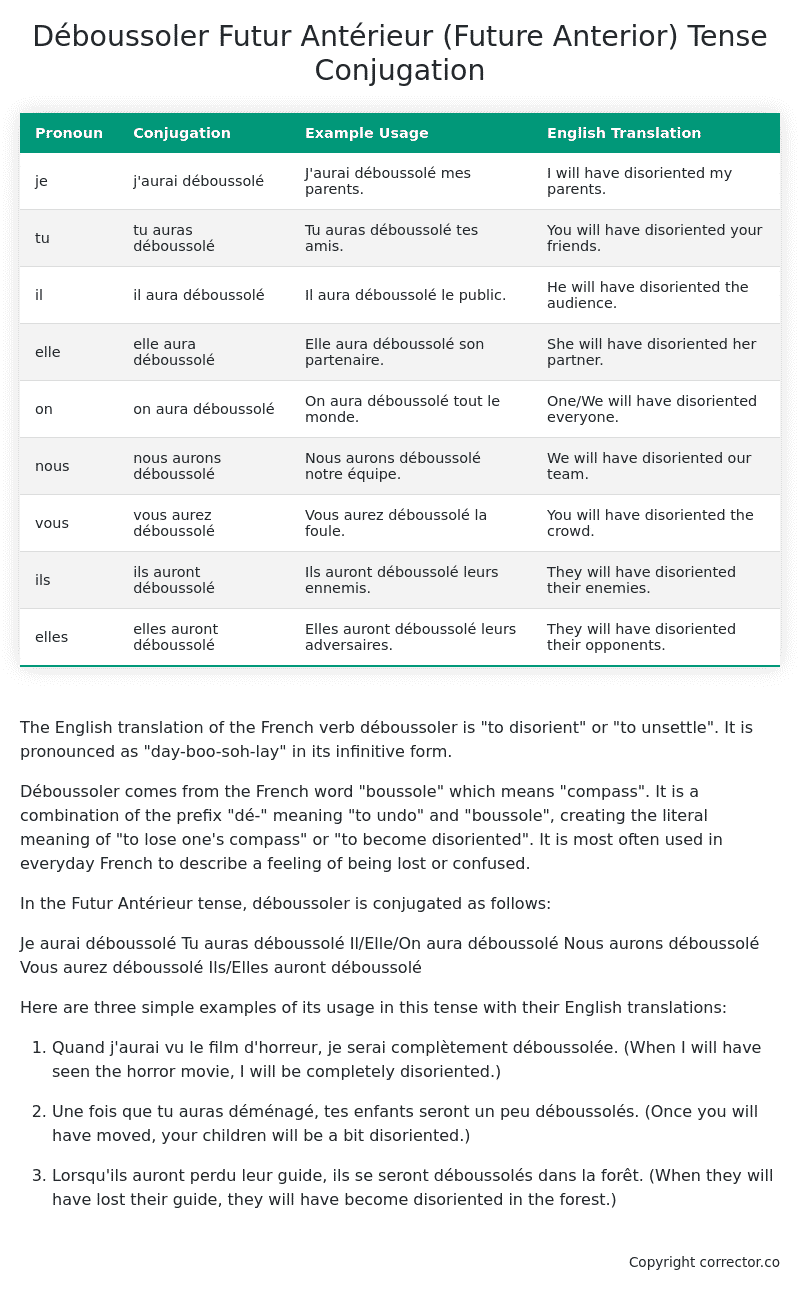Futur Antérieur (Future Anterior) Tense Conjugation of the French Verb déboussoler
Introduction to the verb déboussoler
The English translation of the French verb déboussoler is “to disorient” or “to unsettle”. It is pronounced as “day-boo-soh-lay” in its infinitive form.
Déboussoler comes from the French word “boussole” which means “compass”. It is a combination of the prefix “dé-” meaning “to undo” and “boussole”, creating the literal meaning of “to lose one’s compass” or “to become disoriented”. It is most often used in everyday French to describe a feeling of being lost or confused.
In the Futur Antérieur tense, déboussoler is conjugated as follows:
Je aurai déboussolé
Tu auras déboussolé
Il/Elle/On aura déboussolé
Nous aurons déboussolé
Vous aurez déboussolé
Ils/Elles auront déboussolé
Here are three simple examples of its usage in this tense with their English translations:
-
Quand j’aurai vu le film d’horreur, je serai complètement déboussolée. (When I will have seen the horror movie, I will be completely disoriented.)
-
Une fois que tu auras déménagé, tes enfants seront un peu déboussolés. (Once you will have moved, your children will be a bit disoriented.)
-
Lorsqu’ils auront perdu leur guide, ils se seront déboussolés dans la forêt. (When they will have lost their guide, they will have become disoriented in the forest.)
Table of the Futur Antérieur (Future Anterior) Tense Conjugation of déboussoler
| Pronoun | Conjugation | Example Usage | English Translation |
|---|---|---|---|
| je | j’aurai déboussolé | J’aurai déboussolé mes parents. | I will have disoriented my parents. |
| tu | tu auras déboussolé | Tu auras déboussolé tes amis. | You will have disoriented your friends. |
| il | il aura déboussolé | Il aura déboussolé le public. | He will have disoriented the audience. |
| elle | elle aura déboussolé | Elle aura déboussolé son partenaire. | She will have disoriented her partner. |
| on | on aura déboussolé | On aura déboussolé tout le monde. | One/We will have disoriented everyone. |
| nous | nous aurons déboussolé | Nous aurons déboussolé notre équipe. | We will have disoriented our team. |
| vous | vous aurez déboussolé | Vous aurez déboussolé la foule. | You will have disoriented the crowd. |
| ils | ils auront déboussolé | Ils auront déboussolé leurs ennemis. | They will have disoriented their enemies. |
| elles | elles auront déboussolé | Elles auront déboussolé leurs adversaires. | They will have disoriented their opponents. |
Other Conjugations for Déboussoler.
Le Present (Present Tense) Conjugation of the French Verb déboussoler
Imparfait (Imperfect) Tense Conjugation of the French Verb déboussoler
Passé Simple (Simple Past) Tense Conjugation of the French Verb déboussoler
Passé Composé (Present Perfect) Tense Conjugation of the French Verb déboussoler
Futur Simple (Simple Future) Tense Conjugation of the French Verb déboussoler
Futur Proche (Near Future) Tense Conjugation of the French Verb déboussoler
Plus-que-parfait (Pluperfect) Tense Conjugation of the French Verb déboussoler
Passé Antérieur (Past Anterior) Tense Conjugation of the French Verb déboussoler
Futur Antérieur (Future Anterior) Tense Conjugation of the French Verb déboussoler (this article)
Subjonctif Présent (Subjunctive Present) Tense Conjugation of the French Verb déboussoler
Subjonctif Passé (Subjunctive Past) Tense Conjugation of the French Verb déboussoler
Subjonctif Imparfait (Subjunctive Imperfect) Tense Conjugation of the French Verb déboussoler
Conditionnel Présent (Conditional Present) Tense Conjugation of the French Verb déboussoler
Conditionnel Passé (Conditional Past) Tense Conjugation of the French Verb déboussoler
L’impératif Présent (Imperative Present) Tense Conjugation of the French Verb déboussoler
L’infinitif Présent (Infinitive Present) Tense Conjugation of the French Verb déboussoler
Struggling with French verbs or the language in general? Why not use our free French Grammar Checker – no registration required!
Get a FREE Download Study Sheet of this Conjugation 🔥
Simply right click the image below, click “save image” and get your free reference for the déboussoler Futur Antérieur tense conjugation!

Déboussoler – About the French Futur Antérieur (Future Anterior) Tense
Construction
Common Everyday Usage Patterns
Interactions with Other Tenses
For example
Summary
I hope you enjoyed this article on the verb déboussoler. Still in a learning mood? Check out another TOTALLY random French verb conjugation!


